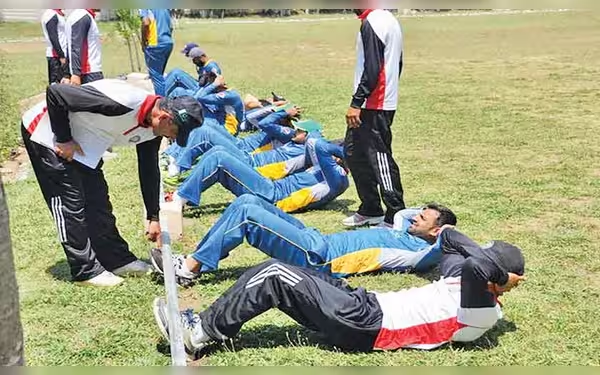Saturday, November 16, 2024 05:48 PM
Prioritizing Fitness in Pakistani Sports
- Physical fitness is crucial for athlete performance.
- Modern fitness tests are essential for athlete selection.
- Tailored fitness programs can enhance competitive success.
 Image Credits: thenews
Image Credits: thenewsThis article emphasizes the importance of physical fitness and modern testing for enhancing the performance of Pakistani athletes in competitive sports.
In recent years, the importance of physical fitness in sports has become increasingly evident. While many Pakistani athletes are often praised for their natural talent and skill, the reality is that physical fitness is a crucial component that cannot be overlooked. Despite occasional moments of brilliance on the international stage, the overall performance of our teams has seen a steady decline, particularly in team sports. This raises a significant question: how can we expect to compete at the highest levels if physical fitness is not prioritized?
It is essential to recognize that physical fitness should be a fundamental aspect of any athlete's training regimen. Unfortunately, discussions with professional athletes in Pakistan reveal a troubling trend of non-seriousness regarding fitness. Although the introduction of gyms has led to some improvements, the focus remains largely on general fitness rather than the specific requirements needed for competitive sports. This lack of emphasis on tailored fitness programs can have dire consequences.
One of the most pressing issues is the management's lack of awareness regarding modern fitness trends. Without the implementation of contemporary fitness tests, the selection and training processes for athletes remain opaque. This ignorance can be detrimental, allowing unfit players to secure positions on teams, only to falter during competitions. In today's sports landscape, testing athletes is not just beneficial; it is essential for their growth and success.
Fitness tests can be categorized into three main types: health-related fitness tests, skill-related fitness tests, and sports-specific tests. Coaches must select the tests that are most relevant to their athletes' performance and training goals. This requires careful consideration of the equipment, testing methods, and the competency of the testing staff. Unfortunately, in many cases, the lack of qualified personnel leads to ineffective testing, which ultimately hampers athletes' development.
Health-related fitness testing is a critical component of an athlete's assessment. This includes evaluating body composition, muscular strength, endurance, aerobic capacity, and flexibility. For instance, body composition assessments provide valuable insights into an athlete's fat distribution and lean body mass, which can significantly impact performance. An increase in lean body mass can enhance strength and power, while reduced body fat can improve endurance and agility.
Another straightforward yet effective test is girth measurement, which helps track changes in muscle size and body composition. This test requires minimal equipment and can yield important data regarding an athlete's physical development. Additionally, advanced techniques such as Dual Energy X-Ray Absorptiometry (DXA) offer precise information about body composition, including fat mass and bone density.
Muscular strength and endurance are also vital for athletes. The one-repetition maximum (1RM) test is the gold standard for assessing dynamic strength, while various endurance tests, such as push-ups and sit-ups, help gauge overall fitness levels. Aerobic capacity assessments, which measure VO2 max, are crucial for understanding an athlete's endurance capabilities.
Despite the availability of sophisticated testing methods, many coaches and trainers in Pakistan still rely on outdated practices or shortcuts. Field tests, such as the 1.5-mile run or the PACER test, can provide valuable insights into an athlete's fitness level without the need for advanced equipment. However, it is imperative that coaches stay informed about the latest testing methodologies to ensure their athletes receive the best possible training.
The path to success in sports is paved with a strong foundation of physical fitness. As we strive to improve our athletes' performances on the international stage, it is crucial to prioritize fitness training and testing. By embracing modern fitness practices and ensuring that only physically fit players represent our teams, we can enhance our chances of success and foster a culture of excellence in Pakistani sports. The time has come to put "fitness first" and recognize that talent alone is not enough to achieve greatness.













